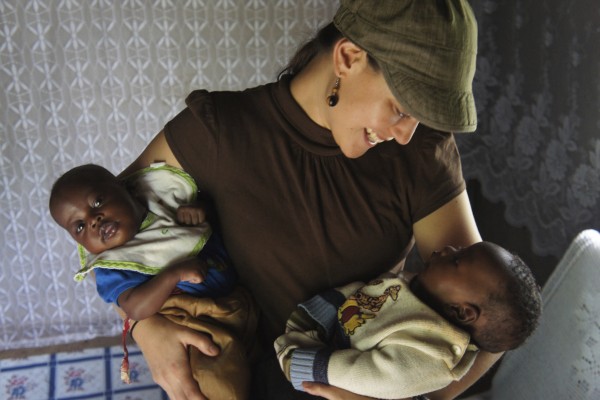This week, I received an email from one of my best friends, Autumn, who is living and working in South Sudan amidst one of today's most pressing humanitarian crises. Refugee camps are overpopulated with men, women and children who lack clean water, sanitation, and sufficient nutrition - causing outbreaks of cholera, hepatitis and impending famine. And outside the camps, violence continues with killings in hospitals, churches and mass rape.
And my sweet, dear Autumn is on the front lines doing her part to address the immediate needs of our South Sudanese brothers and sisters, despite the horrific conditions.
This was her mode of transportation from a recent visit into the field.

But there's something you should know about Autumn: Humanitarian work was not her original career path. It wasn't even her secondary or tertiary path.
In our early twenties when we lived together, Autumn worked for a music label, a recording studio, and even as a makeup artist. While she gleaned great life experience, she continued to be dissatisfied with how she was spending her days.
This is us, with our other roommate Amy (whose incredible story I will tell you about later).

Autumn continued to ask the good and hard questions about vocation and calling. And then she took brave steps to actualize her convictions to be in proximity with the poor.
She left Nashville for a job with a social business in California, applied to grad school at London School of Economics, began internships with major NGOs in the UK and has found her way to coordinating emergency responses to water, sanitation and hygiene in South Sudan's refugee camps.
Her most recent email stated:
"Most days I feel completely inadequate to lead the response efforts in such a crucial way as this. Other days I feel blessed that I get to be here in this moment, and there is nowhere else I would rather be but be in the midst of all that is South Sudan. I feel like when I'm here I'm seeing a picture of love, suffering and life that most people don't, and I'm so challenged and changed by it daily."
I am so proud of Autumn, for being courageous and persistent. For listening to her heart and following that calling. For serving in a moment in time even when the rest of the world's tragedies have overshadowed the very real and horrific one that she is living in. And for choosing hope even when everything in her days tries to convince her otherwise.
As I remember our years together in our Nashville apartment filled with angst and uncertainty about calling and direction, I don't think Autumn could have imagined that this is where she would be today.
Don't count yourself out of the tugging convictions within. Listen to them, seek them out. And let your life surprise you.

(This is in one of the camps that have flooded. And because of open defecation and poor sanitation services, she's literally knee deep in it. With a smile and all.)
-----
More information about the organizations Autumn has been working for and how to help, go here and here.
(All photos courtesy of Autumn Petersen)


 This week, our nation and president are hosting more than 40 African heads of state in Washington, DC. This is the largest summit of its kind, intended to strengthen ties between Africa and the US. There will be many discussions surrounding trade, energy, food security, and innovation.
This week, our nation and president are hosting more than 40 African heads of state in Washington, DC. This is the largest summit of its kind, intended to strengthen ties between Africa and the US. There will be many discussions surrounding trade, energy, food security, and innovation.






 James has been in East Africa for the last two weeks while Baby Jude and I have held the fort down in Nashville. While James' time in Africa is the shortest he's ever taken, it has felt quite long for all of us.
James has been in East Africa for the last two weeks while Baby Jude and I have held the fort down in Nashville. While James' time in Africa is the shortest he's ever taken, it has felt quite long for all of us.
 When I was in high school, I was voted most likely to devote my life to a lost cause. I was mildly offended, but ultimately took it as a compliment.
When I was in high school, I was voted most likely to devote my life to a lost cause. I was mildly offended, but ultimately took it as a compliment.